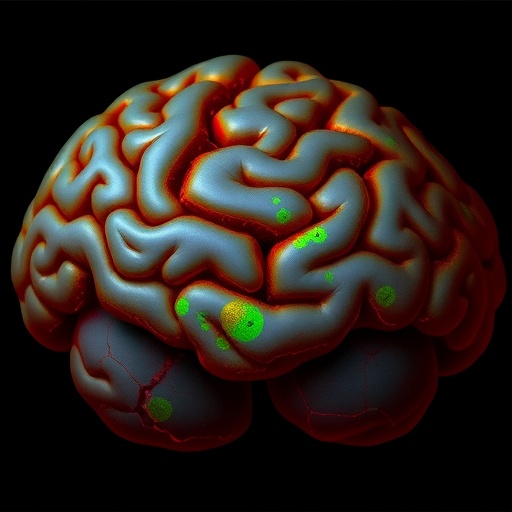
In a groundbreaking study, researchers have unveiled the remarkable potential of pistachio wastes in combating breast cancer, particularly focusing on the MCF-7 cell line. This exploration into the depths of phytochemical profiling and the intricate apoptotic mechanisms offers a promising perspective on harnessing the power of plant-based materials for cancer treatment. Derived from the nutshells, leaves, and other by-products typically discarded during pistachio processing, these wastes have emerged as surprising candidates in the realm of alternative cancer therapies.
The research team, led by renowned scientists, meticulously analyzed the phytochemical composition of pistachio wastes, revealing a treasure trove of bioactive compounds. These compounds, including flavonoids, phenolic acids, and carotenoids, are known for their antioxidant properties and potential health benefits. By delving deep into the complex metabolic pathways influenced by these phytochemicals, the scientists aimed to elucidate the mechanisms through which pistachio wastes can exert their anticancer effects.
Their focus on the MCF-7 breast cancer cell line is particularly crucial, as this model is widely used in cancer research due to its responsiveness to various therapeutic agents. The study employed both in vitro experiments and advanced biochemical assays to assess cell viability, apoptosis, and metabolic modulation. Through comprehensive analyses, the researchers discovered that extracts from pistachio wastes induced programmed cell death in MCF-7 cells, a pivotal mechanism in cancer therapy.
Moreover, the study highlighted that the phytochemical extracts triggered significant alterations in the metabolic profile of the cancer cells. These changes suggest a multifaceted approach in how pistachio wastes exert their anticancer effects, impacting vital pathways involved in cell survival and proliferation. The induction of apoptosis coupled with metabolic reprogramming positions pistachio wastes as a dual-action agent in cancer therapy, a finding that could pave the way for novel treatment methodologies.
As the scientific community grapples with the challenge of developing effective and less toxic anti-cancer agents, the promise of natural products like pistachio wastes becomes increasingly relevant. This study calls attention to the untapped resources at our disposal—wastes that are often overlooked in the agricultural and food industries could play a crucial role in enhancing human health outcomes.
Furthermore, the researchers addressed the environmental implications of their findings. Utilizing agricultural by-products not only provides a potential therapeutic avenue but also promotes sustainability by reducing waste. This intersection of health and environmental stewardship is a compelling narrative that resonates in today’s ecological discourse.
The impacts of these findings extend beyond the laboratory. For patients grappling with breast cancer, the prospect of incorporating plant-based therapies could lead to more holistic treatment protocols. As the body of evidence surrounding the nutritional and therapeutic benefits of nuts continues to grow, health professionals may soon have new recommendations for their patients, emphasizing the consumption of pistachio products.
Additionally, the research underscores the importance of continuous inquiry into the bioactive compounds found in food residues. As more studies lay bare the therapeutic potential of such underutilized resources, the narrative surrounding dietary choices could shift towards a more integrative and health-focused outlook.
Looking ahead, the study paves the way for future investigations aimed at clinical applications of pistachio waste extracts. Researchers are now tasked with exploring optimal extraction methods, dosage responses, and long-term effects in clinical settings. Such inquiries will be critical in translating these findings from the bench to the bedside.
This comprehensive research not only contributes to the scientific understanding of cancer treatment but also embodies a broader cultural shift towards natural and integrative health practices. It invites questions about our food systems and challenges us to rethink waste, urging both consumers and industries to adapt better toward sustainability.
In conclusion, the groundbreaking revelations about the anticancer potential of pistachio wastes serve as a beacon of hope in the ongoing fight against breast cancer. It calls for a collaborative effort among scientists, health professionals, and the agricultural industry to further explore and harness the benefits of these natural compounds for therapeutic use. With continued research and innovation, the future looks promising in the pursuit of effective, safe, and sustainable cancer treatments.
Subject of Research: Anticancer potential of pistachio wastes against MCF-7 breast cancer cells
Article Title: Phytochemical profiling and anticancer potential of pistachio wastes against MCF-7 breast cancer cells: a metabolic and apoptotic pathway analysis
Article References:
Gülüm, L., Güler, E., Zırhlı, Ç.B. et al. Phytochemical profiling and anticancer potential of pistachio wastes against MCF-7 breast cancer cells: a metabolic and apoptotic pathway analysis.
BMC Complement Med Ther 25, 275 (2025). https://doi.org/10.1186/s12906-025-04963-2
Image Credits: AI Generated
DOI: 10.1186/s12906-025-04963-2
Keywords: Pistachio wastes, breast cancer, MCF-7 cells, phytochemical profiling, apoptosis, natural products, cancer therapy, sustainability.
Tags: alternative treatments for breast cancerantioxidants from pistachio by-productsapoptosis mechanisms in cancer cellsbioactive compounds in pistachio wastebreast cancer research MCF-7 cell lineflavonoids and phenolic acids health benefitsin vitro studies on cancer cellsmetabolic pathways in cancer researchphytochemical profiling of pistachiospistachio waste anti-cancer propertiesplant-based cancer therapiessustainable use of agricultural waste




